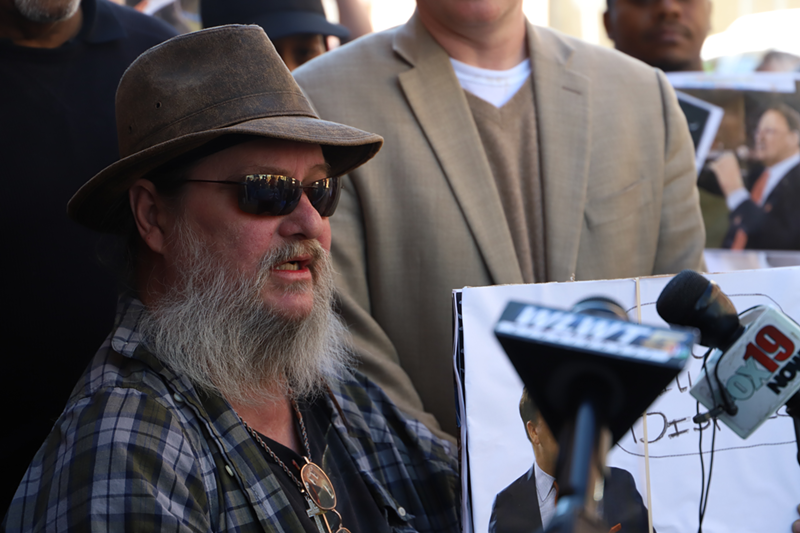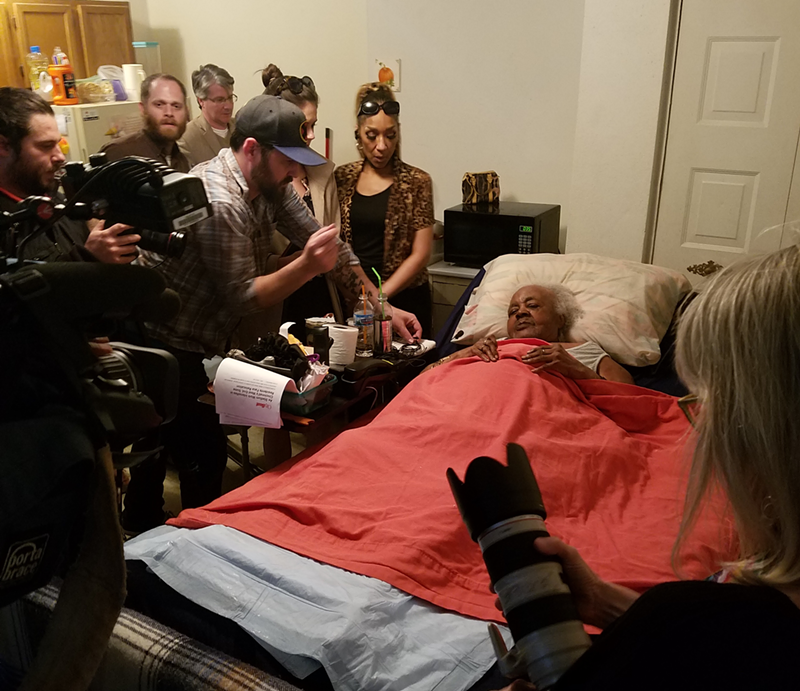
As Mary Frances Page sat in her efficiency apartment on Wade Street in the West End today, wondering when she will have to move, a whirlwind of activity swirled around her.
After news broke that FC Cincinnati purchased the property she lives in next to their coming stadium and that she will eventually have to move, the 99-year-old's story made its way to some Cincinnati City Council members, who discussed her situation and overall housing concerns in the West End today during a committee meeting.
Later, activists and residents held a news conference at Page's apartment to demand a meeting with the team and promises they would not be removed from their homes.
Page's story has kicked up, again, concerns about the impact FC Cincinnati's $250-million Major League Soccer stadium will have on the predominantly African-American community with a median household income of just $13,000 a year. The stadium will be made possible by roughly $64 million in public investment in infrastructure, including site preparation and parking facilities paid for by the City of Cincinnati and Hamilton County.
The team won approval from the Cincinnati Planning Commission and city council earlier this year for a plan that requires a zoning change for the stadium.
FC Cincinnati has since filed a request to amend those plans to include the land that the Wade Street property occupies as well as the neighboring property, which is currently owned by the Jehovah's Witnesses. The Port of Greater Cincinnati Redevelopment Authority is helping to acquire that land. The requested expansion of the stadium site would add an additional five acres for parking to the stadium's actual 11-acre footprint.
The planning Commission will hold a hearing April 22 at 6 p.m. at Seven Hills Neighborhood Houses about that requested amendment and will likely vote on the proposal at its May 10 meeting. Should the commission approve that request, city council will have to vote to finalize the zoning change.
Supporters and the team say the stadium — plus a multimillion-dollar community benefits agreement that comes with it — will be a boon for the neighborhood that has seen decades of disinvestment.
But some residents and their advocates are concerned about rising rents, property taxes and displacement.
Page received a letter in February from her then-landlord Fred Berger informing her that her building had been purchased and that she would have to move by April 30. Berger did not reveal the buyer, but CityBeat reported on documents from the Hamilton County Auditor showing that the team purchased the property.
FC Cincinnati's Community Development Director Mark Mallory acknowledged the team was the buyer yesterday evening. He said FC Cincinnati is working to find housing for Page and about a dozen other residents at the Wade Street property and another location on Central Avenue that the team also purchased from Berger.
Today, the team said it would delay requiring the residents of those buildings to relocate until all found suitable housing.
"I will be convening a meeting of Senior housing stakeholders and West End leaders on Friday to discuss the special circumstances of Ms. Page," Mallory said in a statement today. "I have invited a representative of Ms. Page’s family, the Council on Aging, HOME, CMHA, Seven Hills Neighborhood Houses and the president of the West End Community Council. As we continue to work to a solution for her unique and special situation, there is no immediate urgency for her to vacate her apartment by the date she was originally given by property management. Ms. Page may stay in her apartment until suitable housing is found that will accommodate her special circumstances."
Some residents previously told CityBeat that has been challenging because there is a dearth of housing accepting their Section 8 vouchers.
Page has been offered a property on Mohawk Street, but it has stairs and is less than ideal, her niece Kim Dillard says.
Dillard also said that the team has not communicated with her about Page's status, and that, even when she finds a new apartment, moving will be traumatic for her.
"I'm concerned about my aunt's health at the moment," Dillard told council today. "All this excitement — 99 is a blessing, but it can make her confused from the excitement and everything. And what it's doing to me and my sister is terrible. It is just terrible."
Page's situation is directly related to the stadium, but some council members say that other residents may also be at risk of displacement as demand for real estate in the West End heats up.
"If we don't have comprehensive policy, in another month there will be another Ms. Page," council member Tamaya Dennard said. "Until we really think about policy comprehensively as it relates to the West End, we're going to be right back here."
At the committee meeting, Seven Hills Neighborhood Houses Executive Director Alexis Kidd shared some preliminary results from a housing study being conducted by Atlanta-based urban planning consultancy APD Urban Planning Management.
That study, which is funded via $100,000 from FC Cincinnati stipulated in the community benefits agreement struck last year, shows that roughly 1,200 households — about 34 percent of the neighborhood's population — are at high risk of displacement because they are on fixed incomes, have low incomes and already pay more than 30 percent of their income for housing. Another 300 households are at some risk.
More than 85 percent of the neighborhood residents are renters, according to Census data, and all of them are at risk of displacement as rents rise, according to the study. In addition, more than 350 homeowners could also face problems as property taxes and code compliance issues stack up.
The housing study is taking place concurrently with a separate community engagement effort led by Cincinnati-based Design Impact to gather qualitative information about the West End from residents.
About 1,400 units of housing in the neighborhood are subsidized — either via the Cincinnati Metropolitan Housing Authority, their status as rent-controlled or Section 8. Another roughly 1,500 are market-rate.
"We're trying to protect the affordable units that currently exist in our community," Kidd said. "Our mission is to serve our community and to improve the quality of life of our neighbors. Our agency takes those tough stances, standing with our community to make sure our residents are supported in any way we can."
Managing the coming growth in the West End could prove a complicated task.
There are myriad concerns that Kidd said could challenge residents: rising rents, real estate speculators, rising property taxes and code compliance issues, among others. Residents may not be aware that they are behind on their taxes or that they've been cited for code violations, she said, or may not have the resources to address those issues. In other neighborhoods, those issues have caused big headaches for some long-term residents.
"People don't even know that their property is on that list," Kidd said about compliance or tax issues that can eventually cause a resident to lose their home.
Per the community benefits agreement, the Port of Greater Cincinnati Redevelopment Authority is working with Seven Hills.
"One of the things that we're committed to in partnership with Seven Hills is working for more equitable development," CEO Laura Brunner said. "One topic is the displacement of renters. Another big topic that I think is incredibly important is the opportunity to share the wealth creation that comes from increased investment. There are long-time property owners in the West End that it is my goal to keep as owners."
Among the projects the Port has taken on are six row houses on Baymiller Street. The Port has stabilized those properties, and two will become Habitat for Humanity homes.
But with the good comes challenges as well, Kidd said.
"Our role and the agreement with the Port is truly to be part of the checks and balances," she said. "The Port does great work in terms of helping neighborhoods generate additional wealth and economic growth through housing. But it also has its downfalls — it could displace individuals and has parcels from individuals where taxes have been a problem. Our role is to make sure our community is looked out for and to make sure that we're able to protect properties in our neighborhood and have a say in what development goes on."
Brunner says the Port is committed to helping the neighborhood.
"The reality, as a number of you have mentioned, is that we can't just take the people who were left behind in these neighborhoods 90 years ago as the result of redlining, kick them out and say, 'We're done with these suburban neighborhoods you can have them now,' " Brunner said.
Interest in the neighborhood has been ramping up even before the stadium came into the picture.
In 2012, there were 16 home improvement or mortgage loans written in the three full Census tracts that make up the West End, according to federal data. In a neighborhood that is 85 percent black with a median household income of about $13,000 a year, the $2,124,000 in loans went to applicants with a median income of $58,000 a year. Only three of the recipients were black.
By 2017, the last year for which federal data is available, there were 41 such loans worth $5,554,000 sold to applicants with a median income of $80,000 a year. Thirteen of the recipients of those loans — about 30 percent — were black.
Meanwhile, funding for new affordable housing projects in the West End has lagged. The neighborhood’s last allocation of Low Income Housing Tax Credits — which fund the development of much of America’s low-income, non-Section 8 housing — was $972,000 for the Sands Senior Apartments in 2014.As council, the Port and neighborhood groups think long-term, residents at the Wade Street and Central Avenue expressed more immediate concerns.
Later in the afternoon, the Greater Cincinnati Homeless Coalition held a news conference at the Wade Street property with residents of both buildings to ask for a meeting with FC Cincinnati General Manager Jeff Berding by April 16.
Reporters from several news outlets piled into Page's first-floor efficiency apartment.
"I don't want to move," Page said. "I don't want to move at all. I've been here a long time."
Outside, residents of the Central Avenue building who have yet to nail down housing gathered. Many said they hadn't heard that the team is giving them more time past the April 30 deadline.
"The last notice we got was, 'If you're not out, you're going to be evicted,' " said Crystal Lane, who lives with her five children. Two of her children, Jme Rogers, age 9, and Amier Lane, age 16, also spoke.
The family has lived in the Central Avenue property for five years.
"I feel like this is a community," said Amier. "These are peoples' lives. People come here to be close to their families, to have opportunity, and I feel like they're taking that away. I have a job here. I go to school here. I feel like I shouldn’t have to move because a bunch of white men in suits who have too much money want us to.”
Kenneth Rhodes, who has lived in the Central Avenue building for four years, says he hasn't found housing yet either. Rhodes, 55, has mobility issues and must use a walker to get around. He likes the location's proximity to Findlay Market, bus lines and other amenities.
"I don't want to leave," he said. "I like where I'm at. I've never had any trouble here. I'm comfortable and have everything I need here. I'm scared to go somewhere else, and to be honest with you, I'm not sure how I'll pay to have someone help me move."


